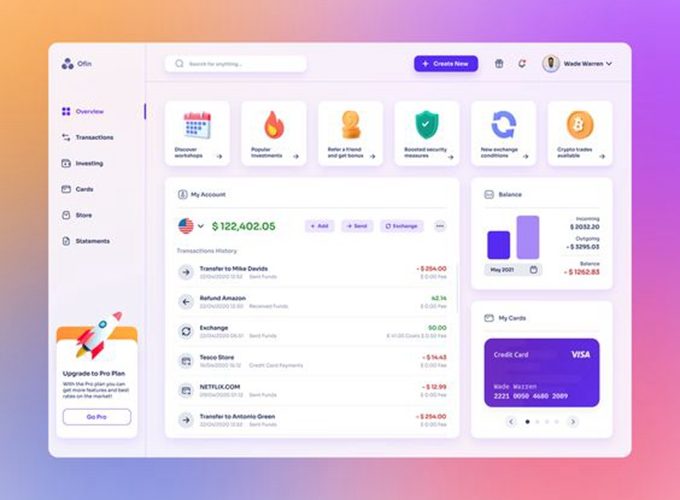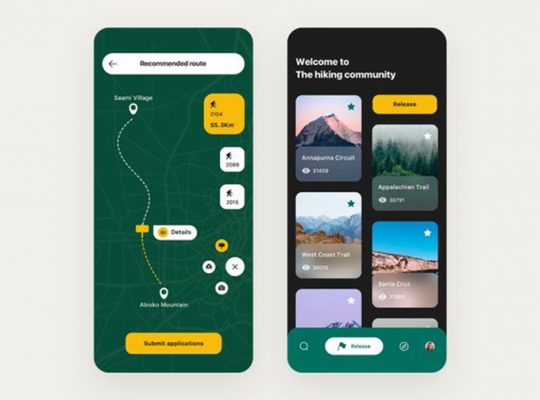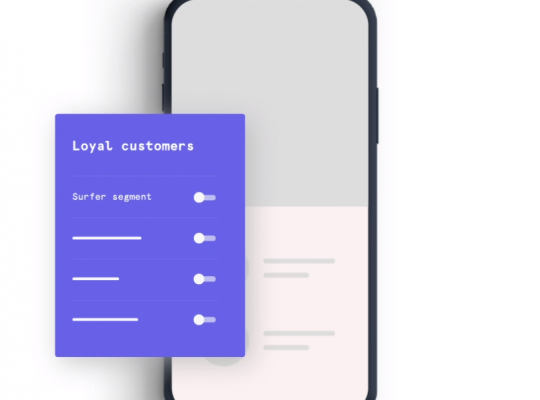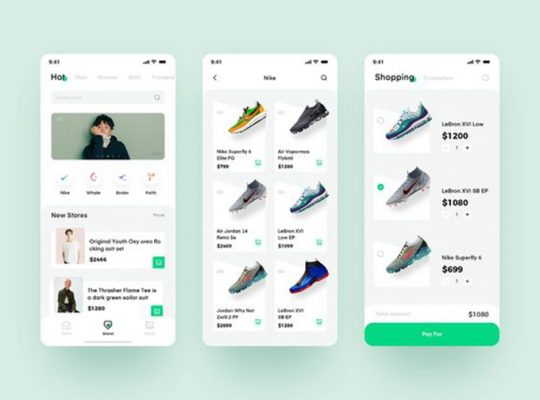In 2018, the European Union’s Normal Information Safety Regulation (GDPR) took impact and launched the start of a brand new period in knowledge privateness. Now the trade’s giants try to show to their customers that they heard their considerations and can shield their knowledge.
Table of Contents
- impact of privacy on app marketing
- buy app downloads
- android app ranking
- buy android review
The app world didn’t escape the privateness frenzy. Of their WWDC occasion in June 2020, Apple introduced a radical change associated to promoting monitoring: the Identifier for Advertisers (IDFA) will change into unavailable to entrepreneurs when customers opt-out of monitoring. A yr later, whereas iOS 14.5 is rolling out, they made privateness one of many star components of their keynote.
Not one to be left behind, Google additionally made confidentiality its precedence with the announcement of its Privateness Sandbox that can block third-party cookies, one of many predominant elements of on-line person monitoring.
With the arrival of App Monitoring Transparency (a function of iOS 14.5 that asks iPhone customers in the event that they wish to permit monitoring after they open an app) at Apple and the top of third-party cookies at Google, the cell promoting world is some huge adjustments.
WHY IS PRIVACY STILL SUCH A HOT TOPIC IN 2021?
Ever since Snowden’s revelations concerning the NSA in 2013, knowledge assortment and the appropriate to privateness have been a few of the predominant speaking factors within the digital world. A examine revealed by Statista. In Might 2021, tells us that 74% of US web customers are extra alarmed than ever about their on-line privateness, and solely 23% of them belief social media advertisements.
The launch of the GDPR in 2018 was the catalyst for a collection of authorized reforms in numerous areas: the California Client Privateness Act (CCPA) and the Brazilian LGPD (each enforced in 2020), after these, privateness payments had been proposed in Hawaii, Massachusetts, New Jersey, Pennsylvania, Rhode Island, Puerto Rico, and Washington.
All these are targeted on defending customers’ private knowledge (and sure, in line with the IAB, the IDFA is taken into account private knowledge beneath the GDPR for instance). Furthermore, privateness is likely one of the predominant considerations for cell customers. Splitmetrics even put privateness as considered one of their prime cell advert developments for 2021, including that 36% of customers said that they had been much less snug sharing their info now than they had been a yr in the past.
It’s no shock that TikTok was the massive success of each 2020 and 2021, however in these two years, the video-sharing app got here beneath hearth a number of instances due to the best way it was dealing with knowledge. The app obtained in hassle with the US and Indian governments over this subject, after which later with the European Union, pushing ByteDance (the corporate proudly owning TikTok) to announce that they might open a Transparency & Accountability middle in Eire in 2022, like those they opened in Los Angeles and Washington.
Though it didn’t cease the Chinese language app from giving itself permission to gather biometric knowledge of US customers, together with faceprints and voiceprints in their new privateness coverage in June 2021. Newspapers tackled the massive query: is TikTok secure? The reply appeared to be a consensus: it collects as a lot knowledge as different social media platforms like Fb, Twitter, or Instagram.
That heavy protection of privateness points with TikTok (along with the US authorities threatening to forbid them entry to the American market) shed a light-weight on the privateness concern shared by so many cell customers. It’s not nearly which firm has entry to your private knowledge, however when you belief them or not on how they may use it.
Customers are closely invested within the matter, whether or not it focuses on the remedy of their private info or the advertisements they’re focused by:
- 41% of cell userssaid that receiving undesirable advertising communications was considered one of their predominant privateness considerations
- 84% of the members ofCisco’s Client Privateness Survey stated they cared about privateness and wished extra management over how their knowledge is getting used.
Information safety is on the forefront of customers’ worries, as can attest to the vital success of the documentary The Social Dilemma which streamed on Netflix and gathered a number of consideration when it got here out.
Customers have a number of questions on their privateness, now greater than ever they’re much less trusting of corporations’ use of their private info. The important thing to success in a privacy-conscious period is to be sure you are reliable to your customers in order that they really feel secure entrusting their knowledge to you. This is the reason Apple made privateness the cornerstone of its 2021 WWDC, after the discharge of iOS 14.5, which already introduced a number of change privacy-wise on Apple’s units.
APPLE’S APP TRACKING TRANSPARENCY FRAMEWORK AND ADVERTISING AFTER IOS 14.5
In June 2020, Apple took the cell trade by storm saying their App Monitoring Transparency (ATT) framework that may change the best way the Identifier for Advertisers (IDFA) might be accessed and used for promoting monitoring. This meant that, after the launch of iOS 14.5 (on April 26, 2021), builders would want to gather an specific opt-in from customers earlier than being allowed to entry their IDFA.
The IDFA is a necessary software of personalised advertisements, it’s additionally the first means by which iOS advert campaigns are measured and optimized. That announcement brought about a number of worry within the promoting trade, how are you going to supply personalised advertisements when you’re not gonna get entry to the IDFA? Everybody agreed that customers could be most definitely to refuse monitoring, particularly when requested with such vocabulary.
Eric Seufert notices on Cell Dev Memo that the official ATT immediate that apps must showcase (a minimum of the non-modifiable a part of it) is wildly completely different from the one Apple makes use of. Builders can not change the primary a part of the immediate which says “[name of the app] would really like permission to trace you throughout apps and web sites owned by different corporations”.
He argues that the ATT immediate textual content is loaded, making customers deal with the monitoring half which could be scary and gained’t encourage them to just accept monitoring. In the meantime, in an iPhone’s settings when selecting to opt-in or opt-out of personalised promoting, Apple is barely asking if you wish to activate personalised advertisements or not with out mentioning that you just permit monitoring.
ATT immediate instance showcased throughout WWDC 2020
Although Apple’s wording could be questioned, the immediate is there to make sure that customers have all of the info at their disposal. Builders who wish to higher inform their customers can at all times arrange a pre-prompt web page and personalize the immediate (to some extent) to assist customers belief them. The web site attprompts.com is registering examples of ATT prompts on a wide range of apps.
Earlier than iOS 14.5, Apple’s customers may nonetheless decide out of monitoring, however that they had to enter their settings and seek for it. The arrival of GRPD and different privateness legal guidelines emphasize the truth that opting-out is giving much less option to the person than opting-in. Customers who activated the Restrict Advert Monitoring operate in earlier iOS are robotically categorized as if having refused monitoring and gained’t see ATT prompts.
Builders are additionally allowed to decide on when the immediate will seem and in the event that they wish to present a pre-prompt web page the place they may have more room and freedom to clarify to their customers why they need to permit monitoring.
Up to now, the ATT opt-in fee is round 20%, as was feared by most advertisers. In two months of existence, ATT is shaping advert spending. As a matter of truth, with the rising adoption of iOS 14.5 (which reached a 70% adoption fee in late June), individuals are shifting their advert spend to Android. Digiday has noticed a transparent shift, stating that entrepreneurs are selecting to allocate more cash to Android than Apple.
Others tried to combat again in opposition to the lack of IDFA by implementing their very personal identifier like Chinese language tech giants who tried to implement CAID (Chinese language Promoting ID). They had been attempting to recreate an identifier just like IDFA to not lose any attain with the implementation of ATT, as they might not must ask for client consent to entry and use CAID. Nevertheless, CAID was shortly banned by Apple, stopping its use.
However ATT is right here to remain, offered because the long-awaited reply to customers’ want for privateness. However Apple has heard the doubts of entrepreneurs (and the drop of advert spend on iOS) and has introduced of their WWDC 2021 that advertisers would obtain a replica of SKAdNetwork postback when iOS 15 goes dwell. It will permit entrepreneurs to have entry to new knowledge, a few of which that they had earlier than shedding entry to IDFA.
IOS 15 IS GOING ALL-IN ON PRIVACY
With the adoption fee of iOS 14.5 (and now 14.6) rising, increasingly customers are confronted with ATT prompts, the vast majority of them selecting to not be tracked. And Apple is planning on shifting ahead with much more privateness features launching with iOS 15 within the Fall.
Have you ever ever questioned what occurs to all the information your cellphone collects? iOS 15’s App Privateness Report is there to reply these questions. It is going to permit customers to see an in depth overview of which apps requested for private info and the way they’re utilizing it. Accessible within the iPhone settings, it is going to showcase what number of instances apps have accessed knowledge, which type of knowledge (contacts, microphone, and so forth.), and the place this info goes.
iOS 15 additionally guarantees new options to guard customers’ emails with Conceal My Electronic mail or additional stopping monitoring with iCloud Personal Relay and Clever Monitoring Prevention.
App Monitoring Transparency is altering the sport of cell promoting, and as standard, huge adjustments go hand in hand between Apple and Google.
ANDROID 12 AND THE COOKIE APOCALYPSE
Whereas Google appears to be reaping the advantages of the ATT framework, for now, the tech large continues to be promoting a giant shift on privateness, primarily by means of their privateness sandbox and what has been referred to as the “cookie apocalypse”.
In 2019, Google introduced the Privateness Sandbox, the initiative goals to create a safer net notably by means of their browser, Google Chrome. The aim of the privateness sandbox is to put third-party cookies to relaxation. Web sites gained’t be allowed to trace customers due to cookies, they must depend on Google’s FLoC (Federated Studying of Cohort) which can analyze customers’ conduct regionally, immediately in Google.
Dubbed the “cookie apocalypse”, the privateness sandbox can be deployed in late 2022, which means Google may begin phasing out third-party cookies in 2023. Their predominant objective is to persuade advertisers that the substitute of particular person identifiers by group identifiers is not going to devaluate the success of their advert campaigns.
Whereas Google is pushing builders to rely increasingly on them, its promoting unit can be the goal of an antitrust lawsuit within the European Union. The progressive disappearance of third-party cookies in Google is seen by some as a transfer that can give the tech large much more energy in promoting. The Californian agency already controls half the worldwide interactive promoting enterprise; quickly, it is going to have unequalled entry to its browser’s customers’ knowledge.
Though Google’s Privateness Sandbox was tailor-made for Chrome, it’s now additionally coming to cell. In June 2021, Google knowledgeable builders that with Android 12, when customers opt-out of advertisements personalization their promoting identifier (GAID) will not be obtainable.
Regardless of some similarities, this differs from Apple’s ATT. For starters, Apple’s ATT prompts are opt-in and present up individually on each app. That means that customers must make a monitoring determination for each single app, one after the other, and so long as they don’t explicitly settle for monitoring, monitoring refusal can be thought-about because the default setting.
Google’s answer will let customers decide out of personalised advertisements, however they may have to take action on their very own (seek for the setting of their cellphone by themselves). As soon as they decide out they may opt-out of monitoring for each app.
Because of this in iOS, monitoring can be off by default and customers might want to opt-in on an app-to-app foundation whereas it will likely be on by default in Android the place customers may have the chance to opt-out for all of them without delay.
WHAT HAPPENS NOW?
Customized advertisements are the spine of the freemium fashions. Additionally they carry extra income than common advertisements. In 2016, a examine led by IHS Markit discovered that the click-through fee for focused advertisements was 5.3 instances greater than for conventional advertisements. It even elevated to 10.8 instances greater when the individual being focused had clicked on related advertisements earlier than. Nevertheless, each the Privateness Sandbox and ATT are gonna make it tougher for entrepreneurs to gather knowledge.
Due to these adjustments, advert personalization will rely extra closely on first-party knowledge, your advert campaigns will rely upon the information you had been capable of accumulate in your customers. There are a number of methods to gather it, whether or not it’s by means of registration info, in-app surveys, or behavioral knowledge.
Each Apple and Google’s new laws will shift the ability imbalance in knowledge assortment. Below the guise of defending the person’s privateness, they’re awarding themselves with much more energy. The European Fee has began an investigation to look into attainable anti-competitive conduct by Google concerning the disappearance of third-party cookies.
Picture by Brett Jordan on Unsplash
As a result of it will likely be more durable for builders to gather knowledge by themselves, they’re extra more likely to must depend on Google and Apple’s share of first-party knowledge, which permits them entry to client’s behavioral knowledge. Nevertheless, you’ll be able to bypass this sort of knowledge by specializing in a contextualized strategy. That means you’d adapt your advert to the context through which it’s shared (like promoting your gaming app subsequent to gaming articles).
First-party knowledge and contextual promoting are the one methods that don’t require cross-site monitoring, which makes them helpful instruments in a privacy-conscious period.
Whereas it’s clear that each Google and Apple will achieve so much with their new privateness laws, it’s necessary to do not forget that, outdoors of an influence play led by the 2 main gamers of the cell trade, customers are nonetheless asking for privateness. Their daring strikes are answering a really actual demand from cell customers, we simply must watch out about the way it’s executed.
The CEO of Courageous (a privacy-focused browser firm), Brendan Eich stated in a Quick Firm article: “Privateness-first means user-first, not Google-first”. Google and Apple are taking part in a rigged recreation the place they maintain the benefit and can probably achieve from the rising costs of internet marketing. However on the coronary heart of the privateness subject is the rising concern from customers and their knowledge.
GIVE USERS WHAT THEY WANT
There’s little doubt that each ATT prompts and the disappearance of third-party cookies will push entrepreneurs to promote on platforms that possess an enormous quantity of first-party knowledge (like Fb and Google) and who gained’t must depend on cross-tracking. It doesn’t imply which you could’t play your playing cards nicely sufficient to come back out on prime of the state of affairs.
A examine led by Akamai discovered that 58% of customers would let corporations they belief use their knowledge to enhance their expertise. If you wish to accumulate helpful knowledge out of your customers, you should make them belief you, and be clear about what you’re gonna do with the data they provide you.
Within the wake of these privateness updates, it is going to change into important to construct a trusting relationship along with your client base. Determine who they’re, what they like, and why they’re utilizing your app. Work together with them as a lot as you’ll be able to (whether or not it’s immediately in-app or with social media), create a bond.
Individuals care about privateness as a result of they wish to be handled as people and never uncooked knowledge or advertising merchandise, they need their experiences to really feel extra real and secure.
HOW TO BUILD A PRIVACY-FRIENDLY APP
To nurture a trusting relationship along with your customers, you should guarantee that your app is tailor-made to respect their privateness. Bruce Gustafson, CEO of the Builders Alliance, is giving nice suggestions on how you can construct a privacy-friendly app:
- Preserve your knowledge requests acceptable(don’t ask for info you don’t must run your app effectively),
- Purge and audit your knowledge every now and then, you don’t must maintain outdated knowledge. Not solely you gained’t must inventory it however your customers is perhaps reassured to know you gained’t maintain years of their knowledge if you solely want the newest ones. As for these you should maintain, you’ll be able to encrypt and phase it so as to add an additional layer of safety
- Be clear,clarify why you’re accumulating knowledge and the way you’ll use it, your privateness coverage needs to be discovered effortlessly in your app and simply comprehensible
- Take note of if you’re asking, ask for the mandatory info at first, then wait till you have got constructed a dependable bond to ask for extra, at all times explaining why you want it in fact!
- Give customers a selection, for many who don’t really feel snug sharing knowledge, you’ll be able to at all times depend on contextual promoting
- Don’t promote knowledge, you’ll lose management over it and should be held accountable for what others have achieved with it (and lose your viewers’s belief within the course of)
- Watch out about altering the principles, at all times warn your customers earlier than altering your privateness coverage
- Keep updated with laws, when you cowl a big territory a few of your viewers could fall beneath a selected jurisdiction and you will have to conform
- Have a catastrophe plan prepared, you by no means know if or when a breach may occur however you should be prepared and work out how you can reassure your customers in case it occurs
In order for you your customers to belief you, you should give them causes to!
LET’S RECAP!
Privateness is a authentic concern shared by a majority of on-line customers. Governments have understood that and tried to arrange legislations (like GDPR and CCPA) to enhance on-line security, and now Apple and Google are making waves within the digital world.
Apple’s App Monitoring Transparency function and Google’s Privateness Sandbox are pushing for a transparent shift within the digital promoting trade. They’re waving an obvious conflict in opposition to monitoring nevertheless it’s clear that decreasing third-party entry to monitoring will profit them whereas permitting them the phantasm of offering their customers with extra privateness.
These adjustments trigger concern as a result of advertisements are a necessary a part of the app world economic system. However you don’t must sacrifice privateness to run a profitable advert marketing campaign. You don’t want person’s knowledge only for promoting, typically you additionally want it to enhance the person expertise in your app. However no matter you do, you’ll be able to’t break your person’s belief, it’s a very powerful factor you have got.
Although huge adjustments are on the horizon, Google and Apple’s energy play will push builders to rely extra on first-party knowledge. Doing so isn’t at all times a burden, you can also make certain your app is secure in your customers and supply them the most effective expertise attainable with out alienating your viewers with safety points.
In the long term, reorganizing your app round first-party knowledge and ensuring your customers really feel secure can be useful in your model. The cell panorama is at all times evolving, however making a trusting relationship along with your customers is a useful software to resist these adjustments.






